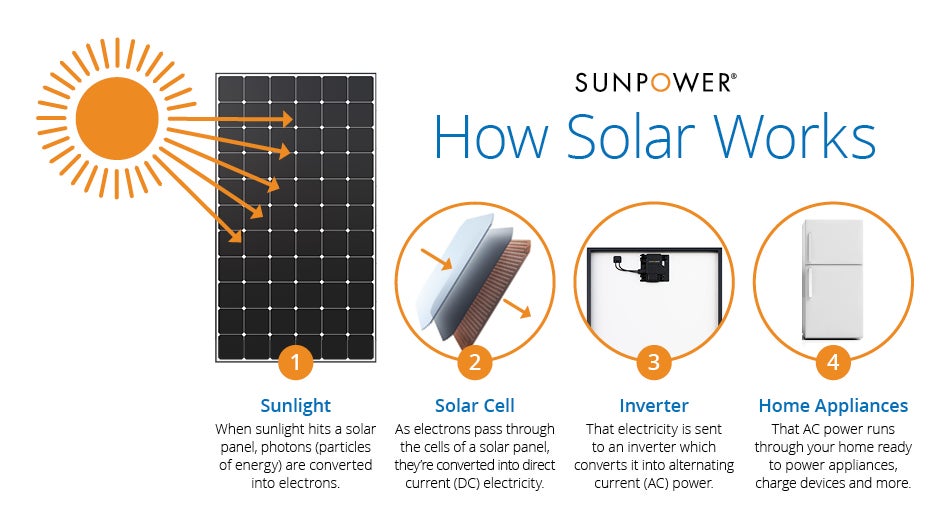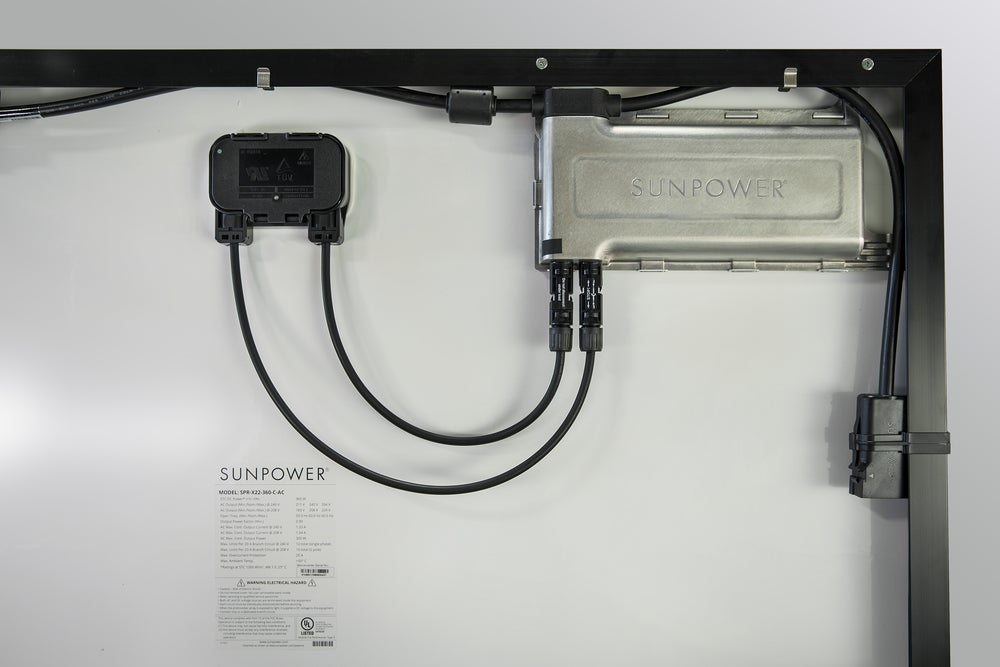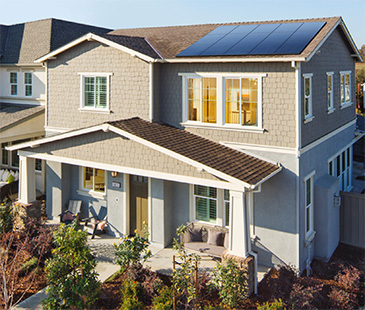What Is Solar Energy and How Do Solar Panels Work?
What Is Solar Energy?
Simply put, solar is the most abundant source of energy on Earth. About 173,000 terawatts of solar energy strike the Earth at any given time, that's more than 10,000 times the world's total energy needs.
Capturing the sun's energy with a residential solar power system that creates clean electricity is a key solution in combating the current climate crisis and reducing our dependence on fossil fuels.
How Does Solar Energy Work?
Our sun is a natural nuclear reactor. It releases tiny packets of energy called photons, which travel 93 million miles from the sun to Earth in about 8.5 minutes. Every hour, enough photons impact our planet to generate enough solar energy to theoretically satisfy global energy needs for an entire year.
Currently, photovoltaic power accounts for only five-tenths of one percent of the energy consumed in the United States. But solar technology is improving and the cost of going solar is dropping rapidly, so our ability to harness the sun's abundance of energy is on the rise.
In 2017, the International Energy Agency showed that solar had become the world's fastest-growing source of power, marking the first time that solar energy's growth had surpassed that of all other fuels. Since then solar has continued to grow and break records around the globe.
How Does Weather Affect Solar Energy?
Weather conditions can impact the amount of electricity a solar system produces, but not exactly in the way you might think.
Perfect conditions for producing solar energy include a clear sunny day, of course. But like most electronics, solar panels are actually more efficient in cold weather than in warm weather. This allows the panel to produce more electricity in the same amount of time. As the temperature rises, the panel generates less voltage and produces less electricity.
But even though solar panels are more efficient in cold weather, they don't necessarily produce more electricity in the winter than in summer. Sunnier weather often occurs in the warmer summer months. In addition to fewer clouds, the sun is usually out for more of the day. So even though your panels may be less efficient in warm weather, they'll still likely produce more electricity in summer than in winter.
Do Some States Get More Solar Energy Than Others?
Obviously, some states get more sun than others. So the real question is: if the weather can affect solar energy production, are some states better candidates for solar energy than others? The short answer is yes, but not necessarily because of the weather.
Take clouds for example. Anyone who has been sunburned on a cloudy day knows that solar radiation penetrates through clouds. For that same reason, solar panels can still produce electricity on cloudy days. But depending on the cloud cover and the quality of the solar panels, the efficiency of the solar panels' electricity production commonly drops from 10 to 25 percent or more compared to a sunny day.
In other words, solar power can still work well in typically cloudy, cold locations. New York, San Francisco, Milwaukee, Boston, Seattle are all cities that experience inclement weather, from rain and fog to blizzards, yet they're also cities where people see huge savings by getting solar.
No matter where you live, solar energy can be an excellent investment and an excellent way to help combat climate change. How much you'll save, and how quickly you'll see a return on your investment in a particular state, depends on many factors, like the cost of electricity, solar incentives available, net metering, and the quality of your solar panels.
How Do Solar Panels Work?
When photons hit a solar cell, they knock electrons loose from their atoms. If conductors are attached to the positive and negative sides of a cell, it forms an electrical circuit. When electrons flow through such a circuit, they generate electricity. Multiple cells make up a solar panel, and multiple panels (modules) can be wired together to form a solar array. The more panels you can deploy, the more energy you can expect to generate.
What are Solar Panels Made of?
Photovoltaic (PV) solar panels are made up of many solar cells. Solar cells are made of silicon, like semiconductors. They are constructed with a positive layer and a negative layer, which together create an electric field, just like in a battery.
How Do Solar Panels Generate Electricity?
PV solar panels generate direct current (DC) electricity. With DC electricity, electrons flow in one direction around a circuit. This example shows a battery powering a light bulb. The electrons move from the negative side of the battery, through the lamp, and return to the positive side of the battery.
With AC (alternating current) electricity, electrons are pushed and pulled, periodically reversing direction, much like the cylinder of a car's engine. Generators create AC electricity when a coil of wire is spun next to a magnet. Many different energy sources can "turn the handle" of this generator, such as gas or diesel fuel, hydroelectricity, nuclear, coal, wind, or solar.
AC electricity was chosen for the U.S. electrical power grid, primarily because it is less expensive to transmit over long distances. However, solar panels create DC electricity. How do we get DC electricity into the AC grid? We use an inverter.

What Does a Solar Inverter Do?
A solar inverter takes the DC electricity from the solar array and uses that to create AC electricity. Inverters are like the brains of the system. Along with inverting DC to AC power, they also provide ground fault protection and system stats, including voltage and current on AC and DC circuits, energy production, and maximum power point tracking.
Central inverters have dominated the solar industry since the beginning. The introduction of micro-inverters is one of the biggest technology shifts in the PV industry. Micro-inverters optimize for each individual solar panel, not for an entire solar system, as central inverters do.
This enables every solar panel to perform at maximum potential. When a central inverter is used, having a problem with one solar panel (maybe it's in the shade or has gotten dirty) can drag down the performance of the entire solar array. Micro-inverters, such as the ones in SunPower's Equinox home solar system, make this a non-issue. If one solar panel has an issue, the rest of the solar array still performs efficiently.

How Does a Solar Panel System Work?
Here's an example of how a home solar energy installation works. First, sunlight hits a solar panel on the roof. The panels convert the energy to DC current, which flows to an inverter. The inverter converts the electricity from DC to AC, which you can then use to power your home. It's beautifully simple and clean, and it's getting more efficient and affordable all the time.
However, what happens if you're not home to use the electricity your solar panels are generating every sunny day? And what happens at night when your solar system is not generating power in real time? Don't worry, you may still benefit through a system called "net metering."14
A typical grid-tied PV system, during peak daylight hours, frequently produces more energy than one customer needs, so that excess energy is fed back into the grid for use elsewhere. The customer who is eligible for net metering may receive credits for the excess energy produced and can use those credits to draw from the grid at night or on cloudy days. A net meter records the energy sent compared to the energy received from the grid. Read our article on net metering and how it works.
Adding storage to a solar system enhances those benefits even further. With a solar battery, customers can store their own energy on-site, further reducing their reliance on grid electricity and preserving the ability to power their homes in the event of a power outage. If the storage system includes software monitoring, that software monitors solar production, home energy use,15 and utility rates to determine which power source to use throughout the day - maximizing the use of solar, providing the customer the ability to reduce peak-time charges, and the ability to store power for later use during an outage.
Ready to learn more about how you can power your home with clean, renewable solar energy?
SunPower is changing the way our world is powered by making solar and storage more accessible to everyone. With nearly 40 years of dedicated solar experience, we're the top-rated U.S. solar company4 with over 15,000 five-star reviews.3 If you're considering installing solar panels, energy storage, or EV charging at your home, make sure you talk to SunPower.
Schedule your free, no-obligation consultation with SunPower by calling 1-385-489-5552. Or click the Get Started button and we'll get in touch with you! Our team of Solar Advisors is here to help make your transition to a sustainable lifestyle.
________________________________________________________________
3 Based on reviews from BBB, Yelp, ConsumerAffairs, BestCompany, Google, SolarReviews and EnergySage review scores as of 3/11/24.
4 Based on public solar providers in the U.S. Includes average of BBB, Yelp, ConsumerAffairs, BestCompany, Google, SolarReviews and EnergySage review scores as of 3/11/24.
14 The availability of net metering varies by location and is subject to change. Your SunPower Dealer can help you determine if you qualify. You can also visit the dsireusa.org website for detailed solar policy information.
15 Additional equipment may be required. Consumption monitoring is not compatible with all electrical services. Check with your installer to see if your home is eligible for electricity usage monitoring.

